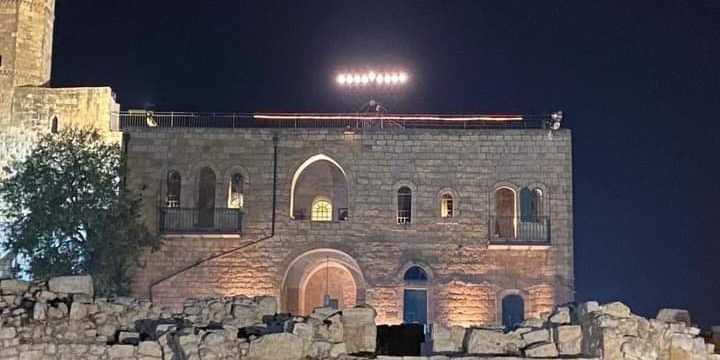After complaints from the Muslim Waqf, the Civil Administration ordered the Nature and Parks Authority to dismantle the Chanuka menorah that was erected on Wednesday on the roof of the Tomb of the Prophet Samuel. The menorah at the site has been a holiday tradition for many years (as can be witnessed in this 2015 tweet) however it was removed after less than 24 hours after it was erected this week in preparation for Hanukkah on Sunday evening.
#Israel Chief Rabbi & #CivilAdministration head lit the 8th #Hanukkah candle at the tomb of Samuel the Prophet pic.twitter.com/yqKKB44INC
— COGAT (@cogatonline) December 13, 2015
The location, less than four miles north of Jerusalem, is believed to be the burial site of the Biblical Prophet Samuel. Evidence of Jewish settlement from the First Temple period was also unearthed by archaeologists in the 1990s. The structure is a former Crusader church that was rebuilt in the18th century into a mosque, with the tomb itself in an underground chamber which serves as a small synagogue. Both Jewish and Muslim prayers are held at the tomb. Many religious Jews visit the tomb on the 28th of Iyar, the anniversary of Samuel the Prophet’s death.
The Coordinator of Government Operations in the Occupied Territories (COGAT) responded: “The Civil Administration considers it of great importance and invests most of its efforts to enable freedom of worship and religion for all religions in the Judea and Samaria area. Last night, a menorah was erected by the inspectors of the Nature and Parks Authority on the roof of the tomb site of Shmuel Hanavi. After the matter was clarified, the menorah was moved to the site plaza, as was the custom every year on Hanukkah. “
وكيل وزارة الأوقاف حسام أبو الرب يستنكر قيام القوات الإسرائيلية فجر اليوم بوضع شمعدان على سطح مسجد النبي صموئيل في القدس pic.twitter.com/4kj6sRWvke
— Rafat Darawsheh (@rafatdarawsheh) November 25, 2021
WAFA News, the official news agency of the Palestinian Authority, cited the Undersecretary of the Ministry of Awqaf and Religious Affairs, Hussam Abu al-Rub, who condemned the “settler move as an infringement upon the sanctity of the site” and he rejected “any Israeli interference in the affairs of Islamic holy sites across Palestine.”
“Israel uses the Jewish nationalist name ‘Judea and Samaria’ to refer to the occupied West Bank to reinforce its bogus claims to the territory and to give them a veneer of historical and religious legitimacy,” WAFA added.
Shmuel (שמואל), known as Samuel in English, played a prominent role in the Hebrew Bible, anointing both King Saul and King David. Though not mentioned by name in the Koran, a character referred to as “the prophet” is described as a prophet of Islam who anointed a Hebrew king called Talut who was rejected by the nation.
Jews had begun efforts to found a village at the site in 1890, originally called Ramah after the biblical home of Samuel, and then referred to by the name of the group which had purchased the lands, Nahalat Yisrael. In 1895, 13 Yemenite Jewish families joined the group and succeeded in the endeavor. The village had to be abandoned during the 1929 riots Arab riots.
The tomb, which is in Area C, is located on the Israeli side of the Israeli West Bank barrier with the nearby Giv’at Ze’ev. Nebi Samuel and the surrounding archeological excavations are now part of a national park.




